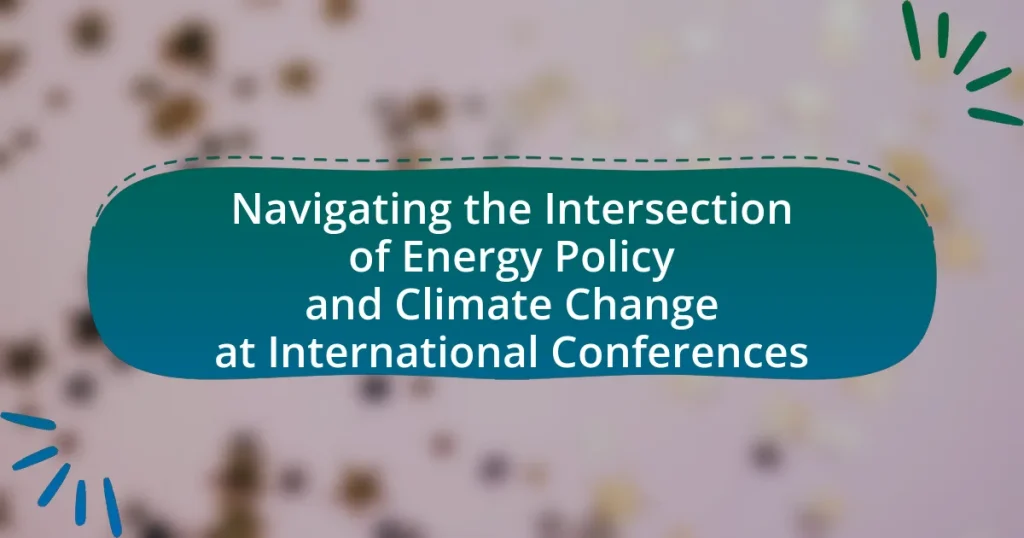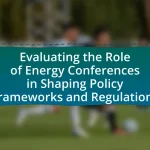The article examines the critical intersection of energy policy and climate change at international conferences, highlighting how these events facilitate negotiations aimed at reducing greenhouse gas emissions while ensuring energy security. It discusses key frameworks such as the Paris Agreement, which emphasizes the need for countries to align their energy policies with climate objectives through nationally determined contributions (NDCs). The article also explores the roles of various stakeholders, including governments, NGOs, and the private sector, in shaping energy policies and addressing climate challenges, as well as the barriers and practical steps necessary for effective collaboration and commitment to sustainable development.
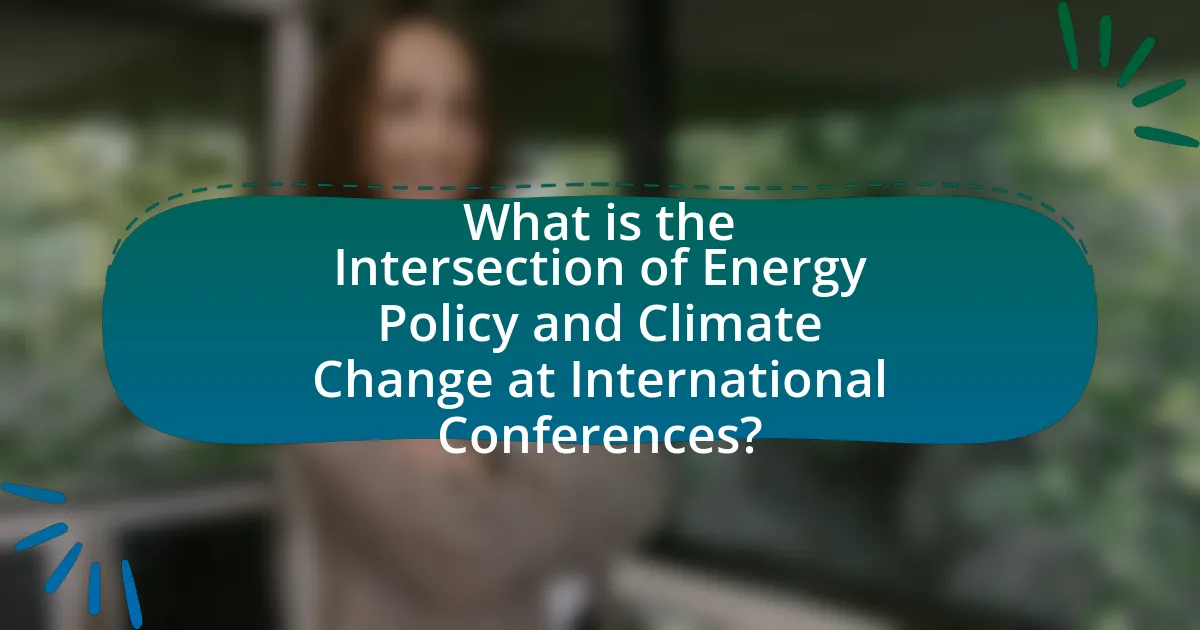
What is the Intersection of Energy Policy and Climate Change at International Conferences?
The intersection of energy policy and climate change at international conferences involves the integration of strategies aimed at reducing greenhouse gas emissions while ensuring energy security and sustainability. This relationship is evident in agreements such as the Paris Agreement, where countries commit to limiting global warming through national determined contributions that often include energy transition plans. For instance, the International Energy Agency reports that transitioning to renewable energy sources is crucial for achieving climate targets, highlighting the necessity of aligning energy policies with climate objectives.
How do international conferences address energy policy in relation to climate change?
International conferences address energy policy in relation to climate change by facilitating negotiations and agreements among countries to reduce greenhouse gas emissions and transition to sustainable energy sources. These conferences, such as the United Nations Framework Convention on Climate Change (UNFCCC) meetings, provide a platform for nations to set targets, share best practices, and commit to actions that align energy policies with climate goals. For instance, the Paris Agreement, established during the 2015 UN climate conference, aims to limit global warming by promoting renewable energy and enhancing energy efficiency, demonstrating a concrete commitment to integrating energy policy with climate change mitigation efforts.
What are the key objectives of energy policy discussions at these conferences?
The key objectives of energy policy discussions at international conferences include promoting sustainable energy practices, enhancing energy security, and addressing climate change impacts. These discussions aim to establish frameworks for reducing greenhouse gas emissions, transitioning to renewable energy sources, and fostering international cooperation on energy technologies. For instance, the Paris Agreement emphasizes the need for countries to commit to nationally determined contributions (NDCs) that align with climate goals, showcasing the importance of energy policy in achieving global climate targets.
How do climate change considerations influence energy policy decisions?
Climate change considerations significantly influence energy policy decisions by prioritizing the reduction of greenhouse gas emissions and promoting renewable energy sources. Policymakers incorporate climate science data, such as the Intergovernmental Panel on Climate Change reports, which highlight the urgent need to limit global warming to 1.5 degrees Celsius. This urgency drives governments to implement regulations that phase out fossil fuels, incentivize clean energy technologies, and enhance energy efficiency. For instance, countries participating in international agreements like the Paris Agreement commit to nationally determined contributions (NDCs) that reflect their climate goals, thereby shaping their energy policies to align with these commitments.
Why is it important to navigate this intersection?
Navigating the intersection of energy policy and climate change is crucial for achieving sustainable development and mitigating global warming. This intersection influences international agreements, such as the Paris Agreement, which aims to limit global temperature rise and promote renewable energy adoption. Effective navigation ensures that energy policies align with climate goals, facilitating the transition to low-carbon economies. Research indicates that countries that integrate energy policy with climate strategies can reduce greenhouse gas emissions more effectively, as seen in the European Union’s comprehensive climate and energy framework, which has led to a significant decrease in emissions since its implementation.
What are the potential impacts of energy policy on climate change mitigation?
Energy policy significantly impacts climate change mitigation by shaping the framework for greenhouse gas emissions reduction and promoting sustainable energy sources. Effective energy policies can lead to a transition from fossil fuels to renewable energy, thereby reducing carbon emissions. For instance, countries that implement stringent regulations on emissions and incentivize renewable energy investments, such as wind and solar, have demonstrated substantial decreases in their carbon footprints. According to the International Energy Agency, a shift towards renewable energy could reduce global CO2 emissions by up to 70% by 2050. Additionally, energy policies that promote energy efficiency can further mitigate climate change by lowering overall energy consumption, which directly correlates with reduced emissions.
How can effective energy policies contribute to sustainable development?
Effective energy policies contribute to sustainable development by promoting the use of renewable energy sources, enhancing energy efficiency, and reducing greenhouse gas emissions. These policies facilitate the transition from fossil fuels to cleaner energy alternatives, which is essential for mitigating climate change impacts. For instance, countries that implement robust renewable energy targets, such as Germany’s Energiewende, have seen significant reductions in carbon emissions while fostering economic growth and job creation in the green sector. Additionally, effective energy policies can lead to improved energy access, particularly in developing regions, thereby supporting social equity and economic development. According to the International Renewable Energy Agency, transitioning to renewable energy could create up to 24 million jobs globally by 2030, further underscoring the link between energy policy and sustainable development.
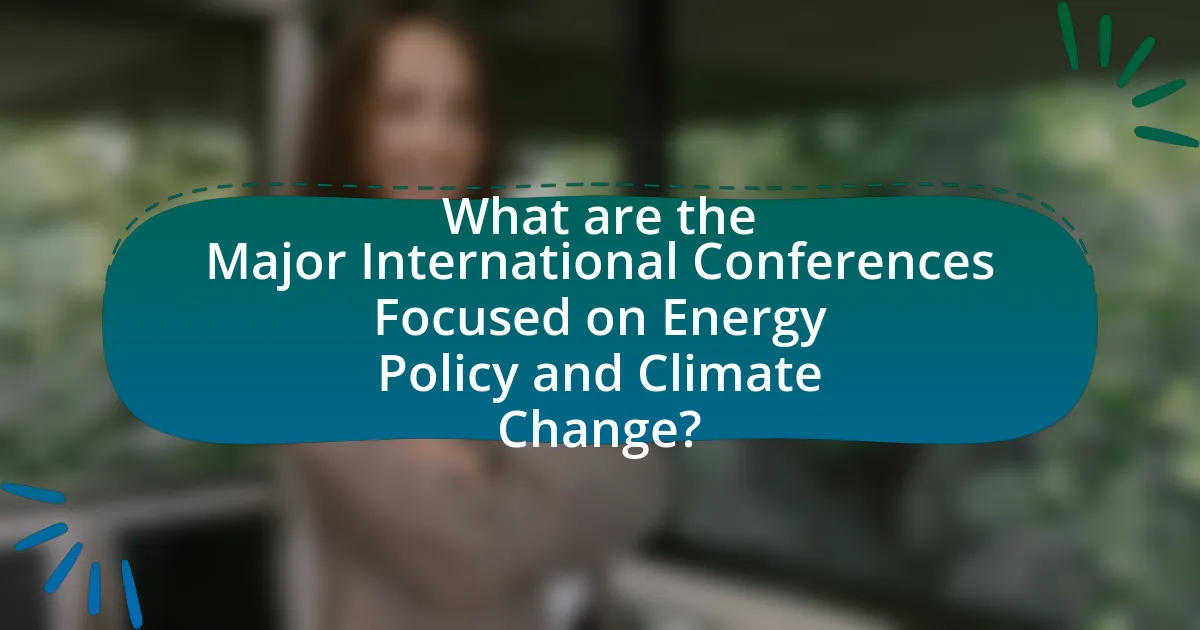
What are the Major International Conferences Focused on Energy Policy and Climate Change?
The major international conferences focused on energy policy and climate change include the United Nations Climate Change Conference (COP), the International Renewable Energy Agency (IRENA) Assembly, and the World Energy Congress. The United Nations Climate Change Conference, held annually since 1995, serves as a platform for countries to negotiate and implement climate agreements, such as the Paris Agreement in 2015, which aims to limit global warming to well below 2 degrees Celsius. The IRENA Assembly, convened annually, focuses on advancing renewable energy adoption and policy frameworks, reflecting the global shift towards sustainable energy solutions. The World Energy Congress, held every three years, brings together leaders from government, industry, and academia to discuss energy challenges and innovations, emphasizing the integration of energy policy with climate action. These conferences play a crucial role in shaping international energy policies and addressing climate change through collaborative efforts and commitments.
Which conferences are considered pivotal in shaping global energy policy?
The conferences considered pivotal in shaping global energy policy include the United Nations Climate Change Conferences (COP), particularly COP21 in Paris, which established the Paris Agreement, and the International Energy Forum (IEF), which facilitates dialogue among major energy producers and consumers. COP21, held in 2015, was significant as it set a global framework for reducing greenhouse gas emissions and promoting sustainable energy practices, with nearly 200 countries committing to limit global warming. The IEF, established in 1991, plays a crucial role in fostering cooperation and understanding among energy stakeholders, influencing policy decisions on energy security and sustainability.
What roles do the UNFCCC and COP play in this context?
The UNFCCC (United Nations Framework Convention on Climate Change) serves as the foundational international treaty aimed at addressing climate change, while the COP (Conference of the Parties) acts as the decision-making body that meets annually to assess progress and negotiate commitments among member countries. The UNFCCC establishes the framework for international cooperation on climate issues, including setting long-term goals and facilitating the implementation of climate action, while the COP provides a platform for countries to negotiate specific agreements, such as the Paris Agreement, which aims to limit global warming to well below 2 degrees Celsius. The effectiveness of both entities is evidenced by the adoption of binding commitments and the mobilization of financial resources for climate action, demonstrating their critical roles in shaping global energy policy in the context of climate change.
How do regional conferences differ in their approach to energy and climate issues?
Regional conferences differ in their approach to energy and climate issues primarily based on local priorities, economic contexts, and regulatory frameworks. For instance, conferences in Europe often emphasize renewable energy transitions and stringent climate policies, reflecting the European Union’s commitment to carbon neutrality by 2050. In contrast, conferences in developing regions may focus on energy access and economic development, prioritizing affordable energy solutions while balancing environmental concerns. This divergence is supported by the United Nations Framework Convention on Climate Change, which highlights that regional contexts significantly influence climate action strategies and energy policy discussions.
What outcomes have emerged from these conferences?
Outcomes from international conferences on energy policy and climate change include the establishment of binding agreements, such as the Paris Agreement, which commits countries to limit global warming to below 2 degrees Celsius. These conferences have also led to increased collaboration among nations, resulting in initiatives like the Climate Finance Mechanism, which aims to support developing countries in their transition to sustainable energy. Furthermore, they have fostered the sharing of best practices and technologies, exemplified by the Global Innovation Lab for Climate Finance, which promotes innovative financial solutions for climate-related projects.
What agreements or frameworks have been established to address energy and climate challenges?
The Paris Agreement is a key framework established to address energy and climate challenges, aiming to limit global warming to well below 2 degrees Celsius above pre-industrial levels. Adopted in 2015 by 196 parties, it emphasizes nationally determined contributions (NDCs) where countries set their own climate action plans. The agreement also includes mechanisms for financial support and technology transfer to assist developing nations in their climate efforts. Additionally, the Kyoto Protocol, established in 1997, set binding emission reduction targets for developed countries, marking an early international commitment to combat climate change. These frameworks collectively represent significant global efforts to align energy policies with climate objectives.
How do these outcomes affect national energy policies?
Outcomes from international climate conferences significantly influence national energy policies by prompting governments to adopt more stringent regulations and commitments to reduce greenhouse gas emissions. For instance, the Paris Agreement established a framework for countries to set nationally determined contributions (NDCs), which directly impacts how nations prioritize renewable energy investments and phase out fossil fuels. As a result, countries like Germany have accelerated their transition to renewable energy sources, aiming for a substantial reduction in carbon emissions by 2030, reflecting the commitments made during these conferences.
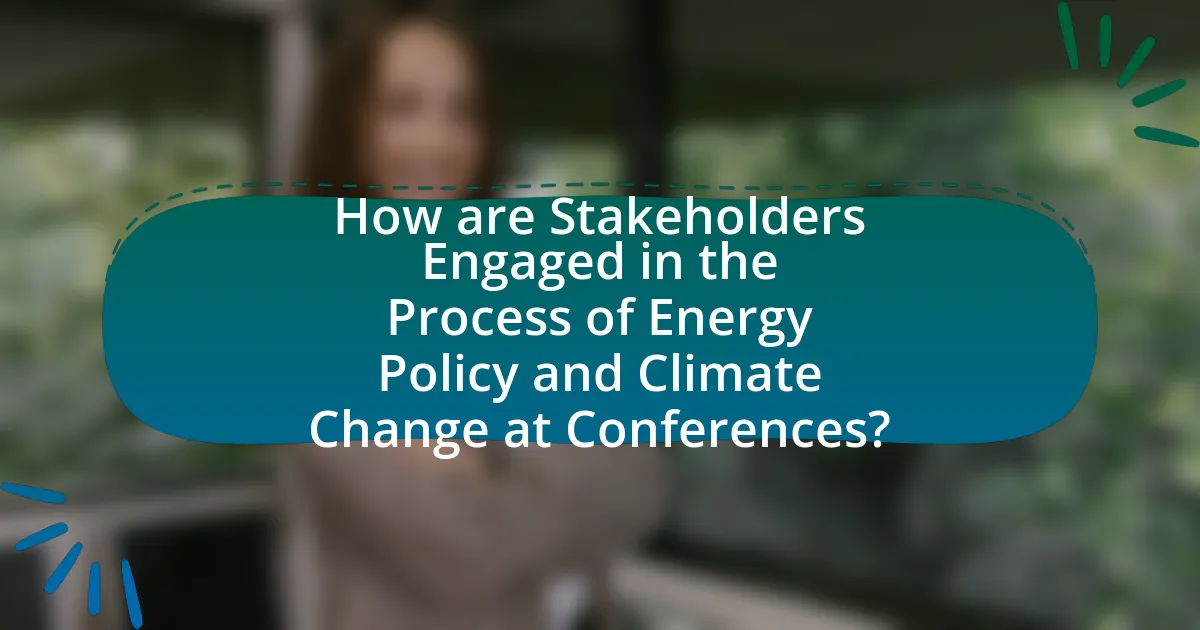
How are Stakeholders Engaged in the Process of Energy Policy and Climate Change at Conferences?
Stakeholders are engaged in the process of energy policy and climate change at conferences through structured dialogues, workshops, and collaborative sessions that facilitate knowledge sharing and decision-making. These engagements often include representatives from governments, non-governmental organizations, academia, and the private sector, allowing for diverse perspectives to be considered. For instance, the United Nations Framework Convention on Climate Change (UNFCCC) conferences actively involve stakeholders in negotiations and discussions, ensuring that their insights and concerns are integrated into policy frameworks. This participatory approach is supported by mechanisms such as public consultations and stakeholder forums, which have been shown to enhance the legitimacy and effectiveness of climate policies by incorporating a wide range of voices and expertise.
Who are the key stakeholders involved in these discussions?
The key stakeholders involved in discussions on navigating the intersection of energy policy and climate change at international conferences include government representatives, non-governmental organizations (NGOs), industry leaders, and academic experts. Government representatives, such as ministers and diplomats, play a crucial role in shaping policy frameworks and negotiating agreements. NGOs advocate for environmental protection and social justice, influencing public opinion and policy decisions. Industry leaders, particularly from the energy sector, contribute insights on technological advancements and economic implications. Academic experts provide research and data to inform discussions, ensuring that decisions are based on scientific evidence. These stakeholders collectively influence the outcomes of international conferences aimed at addressing climate change and energy policy.
What roles do governments, NGOs, and private sectors play?
Governments, NGOs, and private sectors each play crucial roles in shaping energy policy and addressing climate change at international conferences. Governments establish regulatory frameworks and international agreements, such as the Paris Agreement, which sets binding targets for emissions reductions. NGOs advocate for environmental protection, raise public awareness, and hold governments accountable for their commitments. The private sector drives innovation and investment in clean energy technologies, contributing to sustainable solutions and economic growth. Together, these entities collaborate to create comprehensive strategies that address the multifaceted challenges of climate change and energy policy.
How do grassroots movements influence energy policy at international conferences?
Grassroots movements influence energy policy at international conferences by mobilizing public opinion and advocating for sustainable practices. These movements often organize campaigns, protests, and awareness initiatives that draw attention to climate issues, compelling policymakers to consider the demands of the public. For instance, the global climate strikes initiated by youth activists in 2019 significantly impacted discussions at the United Nations Climate Action Summit, leading to increased commitments from various nations to reduce carbon emissions. Additionally, grassroots organizations often provide research and data that highlight the urgency of transitioning to renewable energy sources, thereby shaping the agenda and outcomes of international negotiations.
What strategies can stakeholders use to effectively engage in these discussions?
Stakeholders can effectively engage in discussions on energy policy and climate change by employing strategies such as active listening, collaborative dialogue, and evidence-based advocacy. Active listening allows stakeholders to understand diverse perspectives, fostering an inclusive environment that encourages participation. Collaborative dialogue promotes the sharing of ideas and solutions, which can lead to consensus-building among various parties. Evidence-based advocacy involves presenting data and research to support arguments, enhancing credibility and persuading others to consider specific viewpoints. For instance, the Intergovernmental Panel on Climate Change (IPCC) reports provide robust scientific evidence that stakeholders can reference to strengthen their positions during discussions.
How can collaboration between different sectors enhance policy outcomes?
Collaboration between different sectors can enhance policy outcomes by integrating diverse expertise and resources, leading to more comprehensive and effective solutions. For instance, partnerships between government, private industry, and non-profit organizations can facilitate the sharing of knowledge and best practices, which is crucial in addressing complex issues like climate change. Research shows that multi-sector collaboration can improve stakeholder engagement and increase the legitimacy of policy decisions, as seen in initiatives like the United Nations Sustainable Development Goals, where cross-sector partnerships have been essential for progress.
What best practices should stakeholders follow to maximize their impact?
Stakeholders should engage in collaborative dialogue and establish clear objectives to maximize their impact at international conferences on energy policy and climate change. Collaborative dialogue fosters partnerships and shared understanding among diverse stakeholders, which is essential for addressing complex global issues. Establishing clear objectives ensures that stakeholders can focus their efforts on specific outcomes, enhancing the effectiveness of their contributions. Research indicates that effective stakeholder engagement can lead to more comprehensive policy solutions, as seen in the outcomes of the Paris Agreement negotiations, where diverse stakeholder input was crucial in shaping commitments.
What are the Challenges Faced in Navigating Energy Policy and Climate Change at International Conferences?
The challenges faced in navigating energy policy and climate change at international conferences include differing national interests, economic disparities, and the complexity of scientific data. Countries often prioritize their economic growth and energy security over global climate commitments, leading to conflicts in negotiations. For instance, developing nations may seek financial assistance and technology transfer to meet climate goals, while developed nations may resist binding commitments. Additionally, the scientific data surrounding climate change is intricate and can be interpreted in various ways, complicating consensus-building. The 2015 Paris Agreement exemplifies these challenges, as it required extensive negotiations to balance the diverse priorities of nearly 200 countries, highlighting the difficulty of achieving unified action in the face of competing interests.
What barriers exist in aligning energy policies with climate goals?
Barriers in aligning energy policies with climate goals include political resistance, economic interests, and technological limitations. Political resistance often arises from vested interests in fossil fuels, which can hinder the adoption of renewable energy policies. Economic interests, such as job preservation in traditional energy sectors, create reluctance to transition to greener alternatives. Additionally, technological limitations, including insufficient infrastructure for renewable energy and high initial costs, impede the effective implementation of climate-friendly energy policies. These factors collectively obstruct the necessary integration of energy policies with climate objectives, as evidenced by ongoing debates at international climate conferences where countries struggle to reconcile their energy needs with climate commitments.
How do political and economic factors complicate negotiations?
Political and economic factors complicate negotiations by introducing divergent interests and power dynamics among stakeholders. For instance, countries with significant fossil fuel reserves may prioritize economic growth over climate commitments, leading to conflicts with nations advocating for aggressive climate action. Additionally, political instability can hinder consensus-building, as seen in the 2015 Paris Agreement negotiations, where varying national priorities and economic capabilities influenced the commitments made by different countries. These complexities necessitate careful navigation to reconcile competing interests and achieve effective agreements.
What Practical Steps Can Be Taken to Improve the Intersection of Energy Policy and Climate Change?
To improve the intersection of energy policy and climate change, governments should implement comprehensive carbon pricing mechanisms. Carbon pricing, which includes carbon taxes or cap-and-trade systems, incentivizes businesses to reduce greenhouse gas emissions by assigning a cost to carbon emissions. For instance, countries like Sweden have successfully reduced emissions by 25% since implementing a carbon tax in 1991, demonstrating the effectiveness of this approach. Additionally, integrating renewable energy targets into national energy policies can further align energy production with climate goals, as seen in Germany’s Energiewende initiative, which aims for a significant increase in renewable energy sources by 2030. These practical steps create a framework for sustainable energy development while addressing climate change effectively.
What initiatives can be implemented to foster better collaboration among stakeholders?
To foster better collaboration among stakeholders in the context of energy policy and climate change at international conferences, initiatives such as establishing multi-stakeholder platforms, creating joint task forces, and implementing regular stakeholder engagement sessions can be implemented. Multi-stakeholder platforms facilitate dialogue among governments, NGOs, and private sectors, enhancing transparency and trust. Joint task forces can focus on specific issues, allowing stakeholders to pool resources and expertise, which has been shown to lead to more effective policy outcomes. Regular engagement sessions ensure continuous communication, enabling stakeholders to address concerns and adapt strategies in real-time, as evidenced by the success of the UN Climate Change Conferences in promoting collaborative efforts among diverse parties.
How can countries enhance their commitments to energy and climate goals post-conference?
Countries can enhance their commitments to energy and climate goals post-conference by implementing robust national policies that align with international agreements. For instance, nations can establish legally binding targets for greenhouse gas emissions reductions, as seen in the European Union’s commitment to reduce emissions by at least 55% by 2030 compared to 1990 levels. Additionally, countries can increase investments in renewable energy technologies, which accounted for nearly 80% of global power capacity additions in 2020, demonstrating a shift towards sustainable energy sources. Furthermore, enhancing transparency through regular reporting and accountability mechanisms can foster trust and encourage collective action among nations, as evidenced by the Paris Agreement’s framework for national determined contributions (NDCs).
